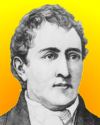 | TODAY IN SCIENCE HISTORY NEWSLETTER - 21 MAY |
| Feature for Today |
 On 21 May 1799, Mary Anning was born, whom Stephen Gould described as "probably the most important unsung (or inadequately sung) collecting force in the history of paleontology." By age 12 she had been collecting fossils from the local seashore, but it was her discovery of a 30-foot complete skeleton of an Ichthyosaurus which made her famous. On 21 May 1799, Mary Anning was born, whom Stephen Gould described as "probably the most important unsung (or inadequately sung) collecting force in the history of paleontology." By age 12 she had been collecting fossils from the local seashore, but it was her discovery of a 30-foot complete skeleton of an Ichthyosaurus which made her famous.She corresponded with, and sold fossils to various noted paleontologists of the day. The sales supported her family, but she also took a keen scientific interest in them. You can read The Fossil-Finder of Lyme-Regis, an article from Chambers's Magazine (1857) published within a decade after her death, to learn more of this remarkable woman's activities, which begin by surviving a lightning strike as an infant. |
| Book of the Day | |
| |
| Quotations for Today | |
 | "We regard as 'scientific' a method based on deep analysis of facts, theories, and views, presupposing unprejudiced, unfearing open discussion and conclusions. The complexity and diversity of all the phenomena of modern life, the great possibilities and dangers linked with the scientific-technical revolution and with a number of social tendencies demand precisely such an approach, as has been acknowledged in a number of official statements." |
 | "The basis of the discovery is imagination, careful reasoning and experimentation where the use of knowledge created by those who came before is an important component." |
 | "I took a glass retort, capable of containing eight ounces of water, and distilled fuming spirit of nitre according to the usual method. In the beginning the acid passed over red, then it became colourless, and lastly again all red: no sooner did this happen, than I took away the receiver; and tied to the mouth of the retort a bladder emptied of air, which I had moistened in its inside with milk of lime lac calcis, (i.e. lime-water, containing more quicklime than water can dissolve) to prevent its being corroded by the acid. Then I continued the distillation, and the bladder gradually expanded. Here-upon I left every thing to cool, tied up the bladder, and took it off from the mouth of the retort.— I filled a ten-ounce glass with this air and put a small burning candle into it; when immediately the candle burnt with a large flame, of so vivid a light that it dazzled the eyes. I mixed one part of this air with three parts of air, wherein fire would not burn; and this mixture afforded air, in every respect familiar to the common sort. Since this air is absolutely necessary for the generation of fire, and makes about one-third of our common air, I shall henceforth, for shortness sake call it empyreal air, ((literally fire-air)) the air which is unserviceable for the fiery phenomenon, and which makes abut two-thirds of common air, I shall for the future call foul air ((literally corrupted air))." |
| QUIZ | |
| Before you look at today's web page, see if you can answer some of these questions about the events that happened on this day. Some of the names are very familiar. Others will likely stump you. Tickle your curiosity with these questions, then check your answers on today's web page. | |
| Births | |
 |  On 21 May 1921 a Soviet nuclet physicist was born. At the end of World War II, he returned to pure science and the study of cosmic rays. But two years later, he began work with a secret research group on the development of the hydrogen bomb. It is believed he was principally responsible for the Soviets' success in exploding their first thermonuclear bomb (1954). After this, he became politically more active in the 1960s, campaigned against nuclear proliferation, and from 1980 to 1986, he was banished and kept under police surveillance. By the time he died on 14 Dec 1989 he was as well known as an outspoken advocate of human rights in the Soviet Union. On 21 May 1921 a Soviet nuclet physicist was born. At the end of World War II, he returned to pure science and the study of cosmic rays. But two years later, he began work with a secret research group on the development of the hydrogen bomb. It is believed he was principally responsible for the Soviets' success in exploding their first thermonuclear bomb (1954). After this, he became politically more active in the 1960s, campaigned against nuclear proliferation, and from 1980 to 1986, he was banished and kept under police surveillance. By the time he died on 14 Dec 1989 he was as well known as an outspoken advocate of human rights in the Soviet Union. What is the name of this man? What is the name of this man? |
 |  A French engineer and mathematician (1792-1843) first described a force resulting from the effect of motion on a rotating body, of paramount importance to meteorology, ballistics, and oceanography. Whereas pressure differences tend to push winds in straight paths, winds follow curved paths across the Earth. In 1835, he first gave a mathematical description of the effect. The force is now known by his name. A French engineer and mathematician (1792-1843) first described a force resulting from the effect of motion on a rotating body, of paramount importance to meteorology, ballistics, and oceanography. Whereas pressure differences tend to push winds in straight paths, winds follow curved paths across the Earth. In 1835, he first gave a mathematical description of the effect. The force is now known by his name.  Can you name this force? Can you name this force? |
| Deaths | |
| |  August (Adolph Eduard Eberhard) Kundt (1839-1894) was a German physicist who developed a method for determining a characteristic property of gases and solids. The principal parts of his apparatus were a long glass tube closed at one end, and a long metal rod with a disk closing the other end, though adjustable in the fashion of a piston. August (Adolph Eduard Eberhard) Kundt (1839-1894) was a German physicist who developed a method for determining a characteristic property of gases and solids. The principal parts of his apparatus were a long glass tube closed at one end, and a long metal rod with a disk closing the other end, though adjustable in the fashion of a piston. What property did he measure? What property did he measure? |
 |  Niccolò Zucchi (1586-1670) was an Italian astronomer who, in approximately 1616, designed one of the earliest reflecting telescopes, antedating those of James Gregory and Sir Isaac Newton. A professor at the Jesuit College in Rome, Zucchi developed an interest in astronomy from a meeting with Johannes Kepler. With this telescope examined heavenly bodies. Niccolò Zucchi (1586-1670) was an Italian astronomer who, in approximately 1616, designed one of the earliest reflecting telescopes, antedating those of James Gregory and Sir Isaac Newton. A professor at the Jesuit College in Rome, Zucchi developed an interest in astronomy from a meeting with Johannes Kepler. With this telescope examined heavenly bodies. Can you name two planets and their features he could observe with his telescope? Can you name two planets and their features he could observe with his telescope? |
| Events | |
 On 21 May 1936, commercial production of a new plastic was begun in the U.S. by DuPont in Wilmington, Del. The plastic (polymethyl methacrylate), is crystal clear, highly non-conducting and has low moisture absorption. Other manufacturers in the world now use other names for this plastic, including Perspex. On 21 May 1936, commercial production of a new plastic was begun in the U.S. by DuPont in Wilmington, Del. The plastic (polymethyl methacrylate), is crystal clear, highly non-conducting and has low moisture absorption. Other manufacturers in the world now use other names for this plastic, including Perspex. By what trademark name is this DuPont plastic known in the U.S.? By what trademark name is this DuPont plastic known in the U.S.? | |
| |  On May 21 of a certain year, the U.S. President declared a state of emergency at Love Canal in Niagra Falls, New York. The property had been a dumping site for Hooker Chemicals and Plastics. The following year, plans were made to evacuate 710 families. The evacuation was ordered after a study reported that 30 percent of the residents in the area had suffered chromosome damage caused by the toxic chemicals leaking through the ground into their homes. On May 21 of a certain year, the U.S. President declared a state of emergency at Love Canal in Niagra Falls, New York. The property had been a dumping site for Hooker Chemicals and Plastics. The following year, plans were made to evacuate 710 families. The evacuation was ordered after a study reported that 30 percent of the residents in the area had suffered chromosome damage caused by the toxic chemicals leaking through the ground into their homes. Which president issued this order? Which president issued this order? |
| |  On 21 May of a certain year, the Aquatic Vivarium, the world's first public aquarium, was opened in Regent's Park, London, the inspiration of an English self-taught naturalist, Philip Henry Gosse, who wrote popular illustrated books on nature, and especially marine biology. He invented the institutional aquarium when he opened the Aquatic Vivarium.. On 21 May of a certain year, the Aquatic Vivarium, the world's first public aquarium, was opened in Regent's Park, London, the inspiration of an English self-taught naturalist, Philip Henry Gosse, who wrote popular illustrated books on nature, and especially marine biology. He invented the institutional aquarium when he opened the Aquatic Vivarium.. In what decade was this first public aquarium opened? In what decade was this first public aquarium opened? |
| Answers |
When you have your answers ready to all the questions above, you'll find all the information to check them, and more, on the May 21 web page of Today in Science History. Or, try this link first for just the brief answers. Fast answers for the previous newsletter for May 20: Hewlett-Packard Company; phonograph record disk; thalidamide; aphids; scurvy; Amelia Earhart; Charles Lindbergh. |
| Feedback |
 If you enjoy this newsletter, the website, or wish to offer encouragement or ideas, please send feedback by using your mail reader Reply button. If you enjoy this newsletter, the website, or wish to offer encouragement or ideas, please send feedback by using your mail reader Reply button. |
--
If you do not want to receive any more newsletters, this link
To update your preferences and to unsubscribe visit this link
If you do not want to receive any more newsletters, this link
To update your preferences and to unsubscribe visit this link
! !



Δεν υπάρχουν σχόλια:
Δημοσίευση σχολίου